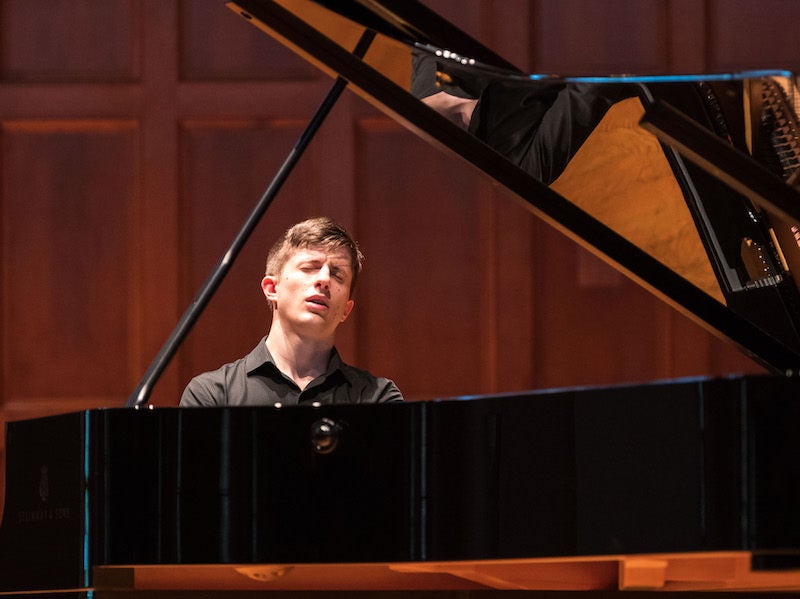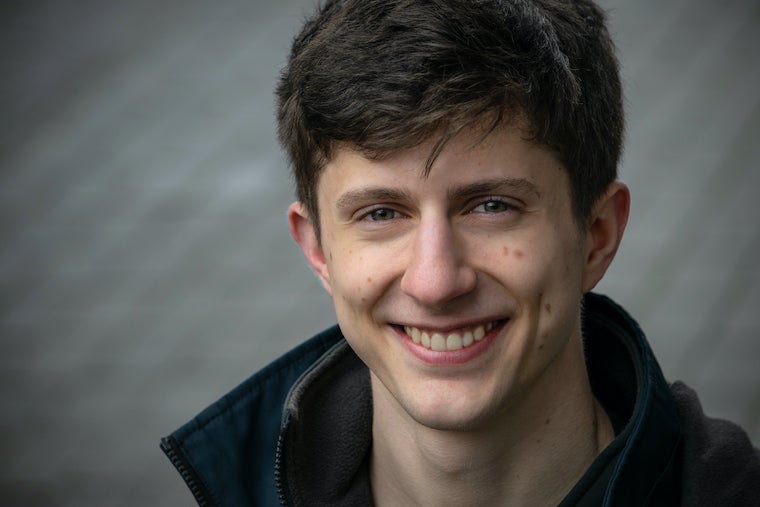Not So Slight Return
November 6, 2020
Erich Burnett

Liam Kaplan ’20 attempts to complete exclusive Piano Honors Program with November 14 recital.
It wasn’t supposed to end like this. But for the first time in months, that’s a good thing for Liam Kaplan.
A standout pianist and composer who completed his Oberlin degree in May 2020, Kaplan was one of many students smarting from a spring semester cut short by the spread of the novel coronavirus. The abrupt end put on hold what would have been a series of crowning moments in Kaplan’s illustrious Oberlin career, among them a concerto performance with the Oberlin Orchestra, a solo presentation of a Bach masterwork, and the premiere of a violin concerto he penned for a fellow student.
One of those milestones will be realized on Saturday, November 14, when Kaplan returns to the stage of Finney Chapel for a solo performance featuring Bach’s seminal Goldberg Variations.
The 7:30 p.m. concert will be presented via livestream at oberlin.edu.
With an affirmative vote by a majority of the piano faculty, the concert would satisfy the final requirement in Kaplan’s quest to complete Oberlin’s Honors Program in Piano Performance, an extremely rare distinction granted to only three students since its inception in 2001.

“I’m honored to be in the company of this very small number of pianists who have gone through this rigorous program,” Kaplan says. “It’s not easy—they set the bar very high in terms of ambition and scope of the project. I’ve learned so much from the experience, and I’m just so excited to do the live performance and tie it all together.”
Kaplan’s piano mentor at Oberlin, Alvin Chow, notes that the piano honors program is intended to recognize only the very pinnacle of conservatory achievement. “Liam is one of that handful of pianists who has dared to challenge themselves to go well beyond the already high standard we expect of our graduating students,” Chow says. “It has been my joy and privilege to make this journey with Liam, as we both have grown tremendously during this arduous process.”
Originally from Montclair, New Jersey, Kaplan has garnered a long list of accolades at Oberlin and elsewhere. In 2018, his Rhapsody on a Chorale for string orchestra was premiered by the Oberlin Chamber Orchestra. The following year, he won the Aspen Conducting Academy’s Piano Concerto Competition and BMI’s Student Composer Award. His Oberlin career included two of the conservatory’s highest honors: the Rudolf Serkin Prize for the Outstanding Sophomore Pianist and the John Elvin Prize for the Outstanding Junior Pianist. In addition to his piano studies with Chow, he studied composition with Stephen Hartke.
Kaplan has appeared at Weill Recital Hall, Tenri Cultural Institute, Merkin Hall, and many other venues across the United States. His compositions have been performed by ETHEL, the Talea Ensemble, Locrian Chamber Players, Da Capo Chamber Players, and the JACK Quartet, among others.
One of the most rigorous and selective performance opportunities available to conservatory students, the piano honors program begins with an invitation from the student’s teacher to take part in an initial audition at the end of junior year. Honors applicants must also have satisfied requirements in accompanying, major performances, and carrry a 4.0 GPA in private study. It is followed by a 35-minute audition performed from memory for the piano faculty; if it is deemed successful, the student then must propose a senior-year project.
For Kaplan, that meant taking on a work that has fascinated him since he was 11, one of the signature entries in all of piano literature. But since Goldberg’s aria and 30 variations amount to only about 70 minutes of music, he was challenged to bolster his rep to satisfy the program’s requirement of 90 minutes. He did so with the addition of his composition 8 Preludes for solo piano—miniatures fashioned in the style of Chopin—and Orpheus Suite, by Oberlin faculty composer Elizabeth Ogonek.
Kaplan studied the pieces throughout fall 2019 and recorded them over five days in Clonick Hall during Winter Term 2020, accompanied by Oberlin audio engineers Paul Eachus and Andrew Tripp. The subsequent recording was submitted to the piano faculty for approval, then to an outside evaluator; it was released in July 2020 and is available on digital music channels worldwide.
“That piece of music is so monumental,” Kaplan says of Goldberg, which he initially grew to love as so many young pianists do: by obsessing over the landmark recording of it made by legendary Canadian pianist Glenn Gould.
“One of the more striking things about it is that you play the theme at the beginning and at the end. It’s an exact repeat of the opening aria, but after that hourlong journey of variations, it’s a completely different experience.” Kaplan marvels at the way Gould’s recording—in stark contrast to the performer’s live renditions—came together like a fabulous mosaic of musical excerpts. He wanted his own interpretation to be played from start to finish, and so he laid down as many complete versions in the studio as time permitted. “It was very important for me that the final aria was actually the end of a complete piece,” he says. “I was totally thrilled with how it came out.”
The piano honors program’s final hurdle is a spring recital of the repertoire in Finney Chapel. That’s when COVID-19 took over, erasing all three of Kaplan’s remarkable moments: his Goldberg performance, which would have doubled as his senior recital; the premiere of his Violin Concerto; and a performance of Liszt’s Piano Concerto No. 2 in A Major with the Oberlin Orchestra—an opportunity that came about as a result of Kaplan’s selection as one of four winners of the 2020 Senior Concerto Competition. (In spring, Kaplan wrote an emotional essay about the experience of rehearsing his Liszt concerto with the Oberlin Orchestra on the final day of classes.)
Amid all the pandemic’s unforeseeable twists and turns, one surprise worked out decidedly in Kaplan’s favor: Soon after beginning remote graduate studies at the Juilliard School this fall, he was invited by Oberlin to serve in a temporary role as a collaborative pianist. His return to the socially distanced campus cleared the way for his Oberlin parade lap to proceed: While use of campus facilities by outside guests is prohibited in light of the pandemic, Kaplan’s conservatory appointment has rendered him authorized personnel—making the November 14 performance possible.
In addition, Kaplan’s Violin Concerto will be recorded on campus later this month by the performers for which it was written: violinist Herdis Guðmundsdóttir ’21 and the Contemporary Music Ensemble. It will premiere in December on Oberlin Stage Left. In a fortuitous bit of scoring that happened well before the coronavirus emerged, Kaplan devised the piece for 16 instruments—the maximum number allowed on stage in accordance with Oberlin’s COVID safety guidelines.
“I’m so fortunate that these major projects I had been working on are still able to happen,” he says. “It feels like tying up some loose ends.”
You may also like…
Contemporary Collaborations with Third Coast Percussion
“Strum,” “Strike,” and “Bend” are all evocative references to the physicality of string and percussion instruments. And one is especially significant.
Martha Redbone Hears Her Musical Call
The vocalist and songwriter brings her distinct blend of folk, blues, gospel, and more to Finney Chapel on April 6 in an appearance with the Martha Redbone Roots Project.
Oberlin Opera Brings “Jack and the Beanstalk” to Schools Across Northeast Ohio for Winter Term
“It was really amazing going into the community and performing an art form that they probably haven't seen before,” second-year voice major Ella Vaugn said, “Teachers would tell us that they've never seen their students so engaged.”


